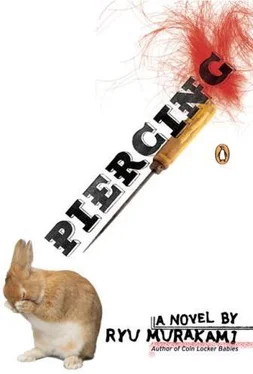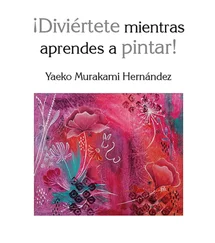Ryu Murakami - Piercing
Здесь есть возможность читать онлайн «Ryu Murakami - Piercing» весь текст электронной книги совершенно бесплатно (целиком полную версию без сокращений). В некоторых случаях можно слушать аудио, скачать через торрент в формате fb2 и присутствует краткое содержание. Год выпуска: 2007, ISBN: 2007, Жанр: Старинная литература, на английском языке. Описание произведения, (предисловие) а так же отзывы посетителей доступны на портале библиотеки ЛибКат.
- Название:Piercing
- Автор:
- Жанр:
- Год:2007
- ISBN:978-1-429-55255-4
- Рейтинг книги:4 / 5. Голосов: 1
-
Избранное:Добавить в избранное
- Отзывы:
-
Ваша оценка:
- 80
- 1
- 2
- 3
- 4
- 5
Piercing: краткое содержание, описание и аннотация
Предлагаем к чтению аннотацию, описание, краткое содержание или предисловие (зависит от того, что написал сам автор книги «Piercing»). Если вы не нашли необходимую информацию о книге — напишите в комментариях, мы постараемся отыскать её.
Piercing — читать онлайн бесплатно полную книгу (весь текст) целиком
Ниже представлен текст книги, разбитый по страницам. Система сохранения места последней прочитанной страницы, позволяет с удобством читать онлайн бесплатно книгу «Piercing», без необходимости каждый раз заново искать на чём Вы остановились. Поставьте закладку, и сможете в любой момент перейти на страницу, на которой закончили чтение.
Интервал:
Закладка:
He still felt the same about Yoko as he had back then: he couldn’t believe he’d managed to meet, fall in love with, and actually marry a woman like this.
He and she were the same age. They’d met six years ago, in early summer, at an art gallery in Ginza. It was the opening of an exhibition of works by a Russian-born French artist named Nicolas de Staël, a painter of sombre abstracts. He wasn’t well-known in Japan and, although it was Saturday afternoon, the two of them were the only visitors. Yoko was the first to speak.
‘Are you an artist?’ she said.
Kawashima was carrying a sketchbook under his arm.
‘I do some drawing, yes,’ he told her.
She was wearing glasses with cream-coloured frames, and they looked good on her, but he couldn’t help thinking she’d be even prettier without them. They left the gallery together and went to a coffee shop with glass walls overlooking the Ginza crossing. He ordered a double espresso and she the shop’s famous cheesecake and a cup of apple tea. The sun of early summer slanted gently through the blinds, and on each table was a glass bud-vase with a single orchid. Yoko smelled good. Mixed with her perfume Kawashima thought he detected another fragrance, though he didn’t yet recognise it as the smell of freshly baked bread. He only knew he found it pleasant, presumably because he really liked this person and felt so relaxed around her. (Conversely, whenever he was stressed out or stuck in the company of someone he didn’t care for, even ambient smells tended to strike him as repulsive.) Yoko ate her cheesecake slowly as she pored over the pages of his sketchbook. At one point a tiny crumb fell on one of the drawings, and she very carefully removed it with the corner of her napkin. Something about the way she did that made him very happy.
They began meeting about once a week to have dinner or visit a museum or see a movie together. Kawashima was working for a graphic design firm and drawing in his spare time. His drawings were all of narrow roads in the moonlight; no other subjects had ever interested him. But one day near the end of summer he drew from memory a pencil sketch of Yoko’s face. When he presented the sketch to her on their next date, she invited him to her apartment for the first time. And there she made a halting and clearly painful confession. Until about a year before, she’d been dating an older man from her company, and on the day they broke up she’d swallowed a handful of sleeping pills and been rushed to the hospital. What did he think of a woman who’d do something like that? Kawashima said he didn’t think it was any big deal, and he meant it.
‘Who hasn’t wanted to die at one time or another?’ he said.
Not long afterwards, they moved in together. They’d been sharing a place for about six months when, late on a freezing winter’s night, Kawashima awoke and leaped out of bed drenched in a sweat that had soaked all the way through the covers. Startled from sleep, Yoko frantically asked what was wrong, but all he would say was that he needed to take a little walk. He threw on some clothes and left the apartment. When he returned, some two hours later, he told her something he’d never told anyone before.
‘I get like that sometimes,’ he said. ‘It’s happened to me ever since I was a little kid, but I never had a name for it until I got older and found it in a psychology book. They call it pavor nocturnus — night terrors. It was even worse when I was little. I’d wake up in a panic and jump out of bed, like I did tonight, only I’d be screaming at the top of my lungs. Sometimes I’d run in circles around the room for, I don’t know, two or three minutes. Afterwards I could never remember anything, only that something had terrified me so badly that I didn’t know who I was and couldn’t even recognise the people around me. It was like they’d melted into my dream, become characters in this nightmare. It was so scary. So scary. Now that I’m grown up, it’s not quite as bad. I mean, I don’t forget who I am anymore, and like, tonight, I knew that was you speaking to me, asking me what was wrong.’
‘So why,’ Yoko asked, ‘did you dash out all alone? Why didn’t you let me hold you?’
Kawashima shook his head.
‘I’ve just always thought it best, when I lose control like that, not to be around anybody else. Better to go somewhere by myself and walk it off, do some deep breathing to calm myself down.’
He decided, then and there, to tell Yoko everything he’d been keeping secret for so long — with the single exception of the time, at nineteen, that he’d stabbed a certain woman with an ice pick. He didn’t want to get into that, partly because the event was so vague and uncertain in his memory, and partly because he feared it might scare her away. He didn’t want to lose her.
‘I think what’s behind them, behind the night terrors, is that after my father died, when I was four, my mother started hitting me. She’d beat the hell out of me. I don’t remember my father at all, except for this vague sense that he used to take us out for drives in a car. And I know he had one, for a while at least, because my mother always used to describe him as the sort of fool who’d put a down payment on a car he couldn’t afford. I haven’t seen my mother for years, but the last time we met, at my high-school graduation, she said she’d treated me the way she did because I reminded her of him — meaning my father the fool. I was afraid of the beatings, because they really hurt, but I always just assumed she must be doing it because I was such a bad kid. The weird thing is, it’s something you can learn to endure, that kind of abuse. You just tell yourself it’s not really you who’s getting beaten. If you concentrate really hard, you can actually get to a place where it doesn’t hurt any more. A lot of times she’d beat me with no warning, and that was especially scary, so I used to try to stay prepared all the time. I’d keep reminding myself: Mother’s going to hit me, Mother’s going to hit me . .
‘What bothered me most, though, was that I was the only one she hit. She never laid a finger on my little brother. As you know, we lived in this little town in the sticks, and the nearest city of any size was Odawara. In Odawara they had a department store with a Playland for little kids on the roof level. The three of us went there together a few times, but when I was about five or six my mother started locking me in the house and taking only my little brother. One time I climbed out the window and ran down the road chasing after them, and she dragged me back to the house and tied me to the water pipes in the bathroom. I remember that so clearly, like it was yesterday. I fell asleep right there on the tile floor, and when I woke up it was dark outside, and all I could see was that empty, narrow little road outside the window. .
‘Not long after that, a middle-school teacher of mine got me placed in a home for abused kids, and that’s when I started drawing. Right from the beginning I drew nothing but pictures of narrow roads at night.’ Kawashima bowed his head. ‘I’ve never told anyone about this before,’ he said, and Yoko took his hand and squeezed it.
They were married a year and eight months after meeting in Ginza. Yoko told her parents that in accordance with the values she and her fiancé shared she didn’t want a wedding ceremony, and they reluctantly agreed. But in fact it wasn’t really about values. She knew Kawashima hadn’t forgiven his mother and younger brother and didn’t want to put him in an awkward position.
‘I was in the Home for a little over two years,’ he’d told her, ‘and then I went to live with my grand-mother, on my father’s side. At my high-school graduation, I don’t know why but my mother apologised to me. It was a pretty self-serving apology but, still, it was an apology. Then, at the end, she said, “You forgive me, don’t you? You forgive your mother?” I nodded without even thinking, but then something in me snapped and I slapped her face, hard. It was the only time I ever hit her.’
Читать дальшеИнтервал:
Закладка:
Похожие книги на «Piercing»
Представляем Вашему вниманию похожие книги на «Piercing» списком для выбора. Мы отобрали схожую по названию и смыслу литературу в надежде предоставить читателям больше вариантов отыскать новые, интересные, ещё непрочитанные произведения.
Обсуждение, отзывы о книге «Piercing» и просто собственные мнения читателей. Оставьте ваши комментарии, напишите, что Вы думаете о произведении, его смысле или главных героях. Укажите что конкретно понравилось, а что нет, и почему Вы так считаете.












